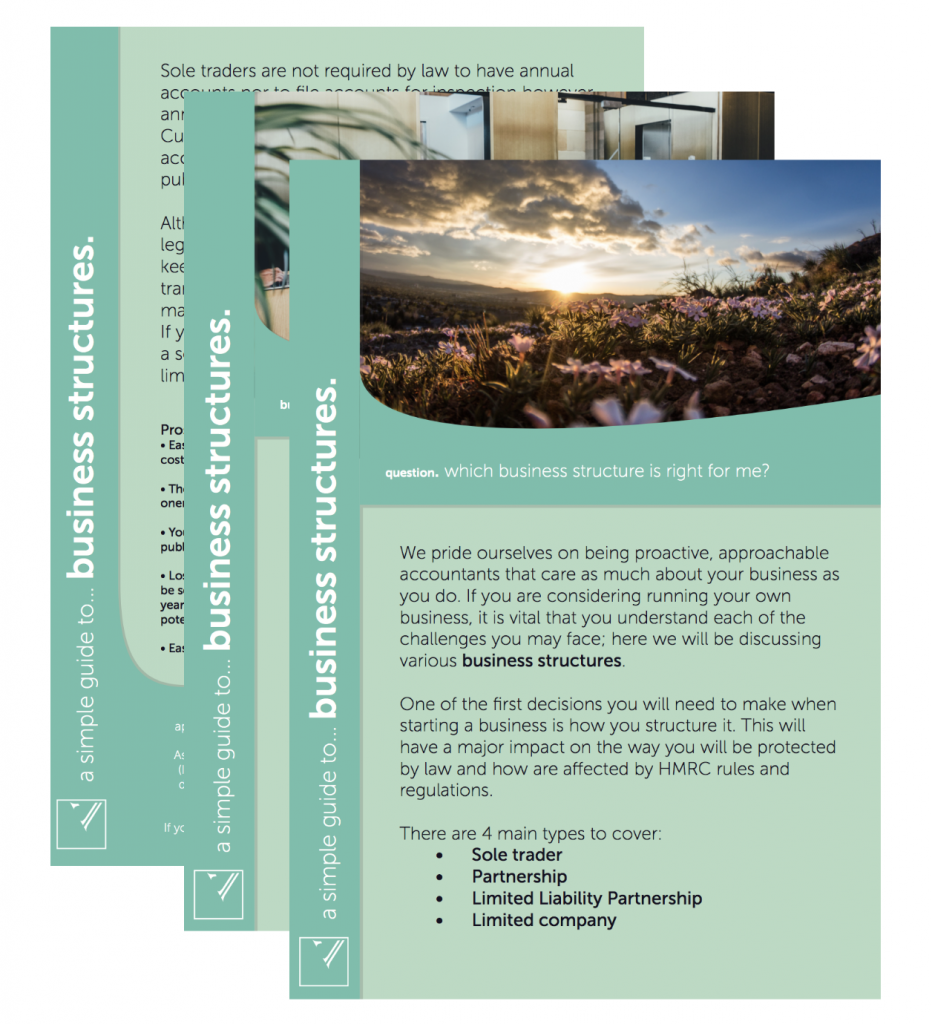One of the key questions many sole traders ask us is “Would I be better off as a limited company?”.
Going incorporated can bring your business a number of benefits, as well as some financial advantages. However, there are many factors to think about before making the leap to limited.
Following on from our Lunch and Learn session at C4DI on Tuesday, we’re taking a look at the main advantages and disadvantages of those three little letters (Ltd).
View and download the VSP Accountancy Services Guide To Business Structures. 
You could reduce your tax bill.
It’s true, switching from a sole trader to a limited company could reduce the amount of tax you pay to HMRC.
When you’re self-employed you pay income tax on all profits, including the ones left in the business.
| Band | Taxable income | Tax rate |
| Personal allowance | Up to £11,850 | 0% |
| Basic rate | £11,851 – £46,350 | 20% |
| Higher rate | £46,351 – £150,000 | 40% |
| Additional rate | Over £150,000 | 45% |
Sole Traders must pay Income Tax on their profits, alongside Classes 2 and 4 National Insurance.
Class 2 if your profits are £6,205 or more a year.
Class 4 if your profits are £8,424 or more a year.
| Class | Rate for tax year 2018-2019 |
| Class 2 | £2.95 a week |
| Class 4 | 9% on profits between £8,424 and £46,350
2% on profits over £46,350 |
Meanwhile, limited companies only pay Corporation Tax, which is a lower rate than Income Tax.
| Financial Years 2017-2019 | 2020 | |
| Corporation tax | 19% | 17% |
Another thing to consider is that Sole traders must pay their Income Tax on account if their tax bill exceeds £1,000. Payments on Account basically means your bill is calculated by looking at the previous year’s accounts and is due in two instalments: 31 January and 31 July. This doesn’t necessarily mean you pay more, but it does mean you have to have more cash up front.
The amount you save depends on your specific circumstances, so it’s worth talking with an accountant to see if it would be financially worth it for your business.
You look like you mean business.
As the old saying goes: ‘Start as you mean to go on’ and this can frequently apply when starting a business.
The small-yet-mighty ‘Ltd’ at the end of your name can give you more credibility when attracting new business.
On the surface, going incorporated can give the impression that you’re more established, but you also need to be a corporation to do certain things, such as seek investment, sell shares and employ staff.
You aren’t personally liable.
As a sole trader, you are your business, but if your business is a limited company, it is a separate legal entity from you. Naturally, this has its advantages.
For example, if the limited company is sued, your personal assets cannot be seized to pay off the debt, only assets owned by your company. Of course, we hope you won’t get into any financial trouble, but it is something to consider when running a business.
You could incur more costs.
The money you earn through your limited company is no longer your own to draw out freely. Instead, the company may pay you a salary, pay dividends on the shares you own if profitable and reimburse you for any expenses you incur personally. If you must take additional money out of the company, you may have to pay extra tax.
Here are the current tax rates on dividends over the £2,000 allowance:
| Tax band | Tax rate on dividends over your allowance |
| Basic rate | 7.5% |
| Higher rate | 32.5% |
| Additional rate | 38.1% |
If you’ve gotten used to spending the money you earn from your business on personal expenses, you’ll have to change your lifestyle to avoid unexpected tax bills.
You have less privacy.
Limited companies don’t have much financial privacy. As a sole trader, your business is your own, but when you file your company’s accounts and confirmation statement, you’ll be revealing the public your figures and company address as they are available via Companies House.
You will have more work to do.
Yep, that’s right, being limited means more paperwork. Sole traders currently have to file one tax return each year. However, when you go incorporated, you’re required to submit a set of accounts, a confirmation statement and a Corporation Tax return.
In the meantime, most directors will be required to submit a personal tax return to HMRC and – if you are an employee of your company – you’ll need to set up payroll.
Again, going incorporated can have significant benefits for your business, but it’s best to speak with an accountant about your specific needs and circumstanced. They should be able to draw up a comparison sheet so you can see how much money you would save by switching.
If you’d like any more information about being a sole trader or limited company, please do get in touch with us today to find out more.

